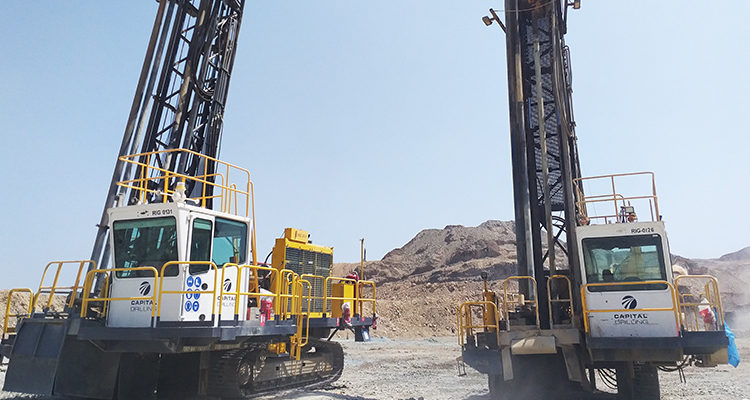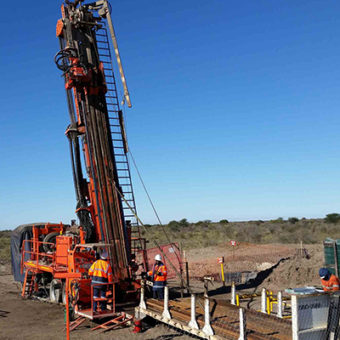Capital Drilling Ltd (LON:CAPD) Chairman Jamie Boyton caught up with DirectorsTalk for an exclusive interview to discuss their strong full year results, big contract wins and extensions, their West African growth strategy and their next steps.
Q1: This morning you released some strong full year results, something shareholders must be really pleased with?
A1: Yes, absolutely, it was a really solid year for the company in 2018 and we had a nice reaction in the share price today.
We had a good performance revenue wise of £116 million, that was actually down just marginally on the year before, but we implemented quite a strategic change as the business deployed more assets to West Africa.
So, it was a tale of two halves, the first half was solemn, the second half was very strong, and it flowed through to improving margins over the year and strong performance in both EBITDA and profitability. Our EBITDA was up 16% year-on-year and our net profit after tax was up 48% year-on-year. So, in the context of the 3% weaker on the revenue, we had really solid performance as you went down the profitability lines.
Some big wins operationally, we had 0 LTI’s which is a safety record for us which is quite outstanding, and we made enormous progress in redeploying fleet to West Africa, we’re building infrastructure in West Africa and winning contracts in West Africa.
So, we’re pleased with the results and it would appear shareholders are as well.
Q2: As you mentioned, you did have some big contract wins and extensions in the last twelve months, can you tell us about the most significant ones?
A2: I put them in two different camps, the significant new ones which was part of the group’s push into West Africa, so we started to have the assets arrive in that part of Africa in Q1 and started to win contracts in Q2 and commenced those contracts in Q3.
Some of the bigger ones were winning contracts with the likes of Hummingbird at the Yanfolila mine in Mali and a contract with Resolute, we had an extension there for surface exploration and the most recent one that was announced in West Africa region was with Sama Resources in the Ivory Coast. So, we’ve now got, with the existing contract that we have with Tasiast, Tasiast being in Mauritania, quite a nice base of operations in West Africa to grow from.
Within the traditional business, we had two very significant contract extensions that we announced in the second half of the year. The first we announced was a 5-year extension of our drill and blast and our grade control drilling at the Sukari Gold mine so that contract now runs out to 2023 so that’s the biggest win for the company. We’ve been there since 2005 so really, it’s testimony to the great work the team has done on the ground.
We also received a contract extension at the Geita Gold mine for all our underground drilling, it’s a subcontract of the master contract but that was extended out to the end of this year and we’re pretty confident we’ll get further extensions moving forward.
So, across the board, there were some really solid contract wins that we’re very pleased with.
Q3: How do you feel your West African growth strategy has gone so far?
A3: I think well but there’s a lot more to come. We actually released a presentation, obviously, with the results and when you isolate just the exploration spending in the African continent, Tanzania and Egypt, which are the traditional markets for our company, account for about 5% of the spend last year, West Africa accounts for 45%.
So, I think up and until now the strategy has gone well, we certainly worked very hard, as I said, building infrastructure, getting rigs across, we’ve made hires in business development, so we’ve ticked a lot of boxes to really get that platform into place.
We’re very confident that, over the next 12 months, we’ll see more contract announcements because, obviously, we’ve now got the assets and the people on the ground to start picking up some of that 45% market share.
Q4: You mentioned the next 12 months, what are the next steps for Capital Drilling here, let’s look over the 6-month period?
A4: There’ll be more rigs moving into West Africa, we’ve still got a few more rigs we want to move in there, just to build out the rest of the fleet to make sure that we have all the different types of drill rigs available for our customers.
As I just alluded to, we’ve just made another business development hire, literally only probably 2 weeks ago, start of March actually, he joined us at the start of March and as I said, we think we’ll see more contract wins over the course of Q2 and onwards.
We’re also busy working on the analysis of adding some further business streams, to add to the group. The company started with exploration drilling and moved into blast hole and grade control and then underground drilling, but we’ve also added laboratory services, we’ve also added maintenance services.
So, that’s part of another big focus for the group to not only continue our growth in the drilling side of our business but adding further business streams and we hope to show some decent progress to the market later in the year.
Q5: Capital Drilling is in the top 10 mineral drillers by rig fleet, the top 3 account for over 70% of the market. Do you think there’ll be a consolidation amongst the smaller players in order to compete with the big guys?
A5: Look, given the consolidation that we’re seeing in the gold sector at the moment, there is certainly a lot of discussions starting to happen at the smaller end, we have seen some consolidation take place already in the West African region, particularly in Burkina Faso and the Ivory Coast.
It could become prevalent, but it is early days with what we’re seeing in terms of that activity, I think the industry tends to get read by the customer base and the customer base is clearly seeing some signs of consolidation at the moment.








































